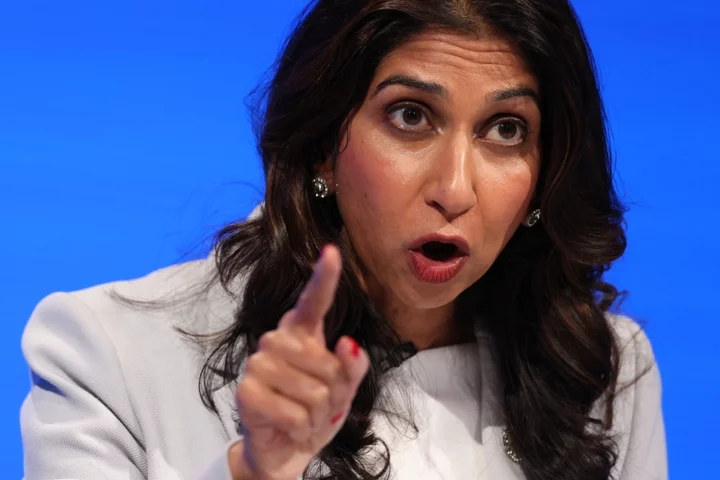Home Secretary Suella Braverman faced a backlash after she accused London’s Metropolitan Police of playing “favorites” with protest groups, heaping pressure on Prime Minister Rishi Sunak to end a political alliance borne out of expediency that looks increasingly like a liability.
Read more: Sunak Blinks in Police Showdown Over Pro-Palestinian March
The remarks, which came in a Times newspaper commentary published hours after Sunak had agreed the march would go ahead, are likely to further strain relations between the government and police at a critical time, with tens of thousands of people expected to attend a pro-Palestinian rally on Saturday. Braverman, a pugilistic politician brought back by Sunak to help appease the right of his Conservative Party, again called them “hate marchers.”
Tensions have been running high for days as senior ministers warned the protest — which have been held each Saturday since the Israel-Hamas war began — would disrupt Armistice Day events to mark the end of World War I. Right-leaning newspapers such as the Daily Mail piled in, and Sunak himself said the march was “disrespectful” and that the Cenotaph and other war memorials risked being “desecrated.”
Yet the police resisted ministers’ demands to block the rally, arguing that there was a balance to be struck between risks and the legal right to protest. After Metropolitan Police Commissioner Mark Rowley was summoned to Downing Street for talks on Wednesday, Sunak issued a statement indicating the police’s view had prevailed — though clearly not with Braverman.
“There is a perception that senior police officers play favorites,” Braverman wrote. “Right-wing and nationalist protesters who engage in aggression are rightly met with a stern response, yet pro-Palestinian mobs displaying almost identical behavior are largely ignored, even when clearly breaking the law?”
The comments tap into popular complaints in right-wing politics about “cancel culture” and the view that Britain’s institutions display a left-wing bias. But Braverman went much further in her op-ed, drawing a link between the pro-Palestinian march with annual parades in Northern Ireland.
‘Terrorist Groups’
“They are an assertion of primacy by certain groups — particularly Islamists — of the kind we are more used to seeing in Northern Ireland,” she wrote. “Also disturbingly reminiscent of Ulster are the reports that some of Saturday’s march group organizers have links to terrorist groups, including Hamas.”
Ian Paisley, an MP for Northern Ireland’s Democratic Unionist Party, welcomed Braverman’s statement and accused nationalist groups of displaying support for Hamas and Hezbollah in the past. But elsewhere the sensitivity of her comments triggered an immediate backlash.
“She is deliberately inflaming community tensions in the most dangerous of ways,” Labour’s shadow home secretary, Yvette Cooper, said in the House of Commons on Thursday. “She is encouraging extremists on all sides, attacking the police when she should be backing them.”
Ahead of the march, Sunak and Braverman were not obviously working at cross purposes. While the home secretary’s comments appeared more strident, the prime minister didn’t explicitly criticize them. It reflects a central reason for Sunak to have such a potential rival in his Cabinet — what his aides have described as her “purpose” — because she helps keep right-wing Tories onside.
Leadership Bid
But her position looks less certain the more Conservative MPs criticize her. Her recent remarks that homeless people are sleeping on the streets as a “lifestyle choice” and her repeated use of “hate marches” to describe the pro-Palestinian protests have fueled complaints that Braverman is focused more on her own leadership ambitions than running the country.
“Tone matters,” Conservative MP Richard Graham said this week on social media in reference to Braverman. “It’s our duty to calm not inflame: to reduce, not increase, tensions.”
Some Tory MPs suspect Braverman may actually want to be fired, calculating that with the Conservatives so far behind in opinion polls, it would boost her chances of taking over the party following a general election expected in 2024. The argument is that the longer she stays in Cabinet, the more she could be tainted by association with a losing administration.
Read more: A Problem Like Suella: The Readout with Kitty Donaldson
Beyond party politics, there is growing concern that the government’s rhetoric around the weekend march has actually added to the risk of disruption. Organizers have said for days the march route would avoid the Cenotaph war memorial and wait until after official Armistice Day events to start.
Right-Wing Anger
The fear is that by drawing more attention to it, rival groups may use the march as a justification to cause disruption. Right-wing activist Tommy Robinson said on X, formerly Twitter, that his supporters are going to London to ensure “there is respect shown at our Cenotaph” and that “we cannot trust the police to do their job,” though he also urged them to behave. The Democratic Football Lads Alliance, which has been accused of Islamophobia, is also reportedly planning a counterprotest.
Meanwhile Tom Winsor, the former Chief Inspector of Constabulary, told BBC radio Braverman’s intervention “crosses the line” and ran contrary to the convention that police decisions are independent. “It’s unprecedented.”
That is likely to ring alarm bells for Sunak, who made clear Wednesday that while he disapproved of the pro-Palestinian march, he accepted the decision should lie with police. Braverman’s intervention is a direct challenge to that.
“Either the prime minister has endorsed this, or he is too weak to sack her,” Labour’s Cooper told lawmakers.

